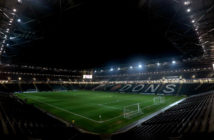Goalkeepers are a funny bunch – often unnoticed, often under-appreciated, and often misunderstood. Goalkeeper watch shines the spotlight – good, or bad – on the men between the sticks.
In the ninth edition of Goalkeeper Watch, the EFL and Premier League fixtures between Friday 15th and Monday 18th January are under the spotlight.
There’s always a strange tad of disappointment lingering when searching for credible nominees for goalkeeper of the week. The Premier League highlight reels are often the most accessible, and the coverage around the top division makes it easy for one to, simply, only consider goalkeepers from it. Yet, often there are countless goalkeepers from lower leagues that are deserving of the spotlight.
However, so far on Goalkeeper Watch, we’ve awarded the (literary) trophy to:
- x3 Championship goalkeepers
- x1 League Two goalkeeper
- x1 Scottish Premier League goalkeepers
- x1 Under 23 goalkeeper
- x4 Premier League goalkeepers
So we’re trying to ensure that nobody goes under-represented.
Goalkeepers are the backbone of any successful team. You can win the league without an out and out number nine, but you can’t without a solid pair of hands at the back.
When Jurgen Klopp arrived at Liverpool in 2015, it was clear that a revolution was emerging from the first day. Not necessarily on the pitch, because results didn’t pick up particularly quickly, but in the club ethos and atmosphere on Merseyside.
Four years later, Klopp is lifting the Premier League title. But why didn’t this occur sooner?
Well, as goalkeepers we know that as the last line of defence, mistakes tend to lead to goals. But, it’s equally infuriating when the blame for losing games or bottling titles is heaped solely upon the men (or women) between the sticks. Take Adrian, against Atletico Madrid in the Champions League for instance. Yes, he could have done better for all three goals, but Liverpool were wasteful up front.
Embed from Getty Imageswindow.gie=window.gie||function(c){(gie.q=gie.q||[]).push(c)};gie(function(){gie.widgets.load({id:’noXjI7JlQNxM9L9OmdwGdA’,sig:’0Q-rS3ZF4SeZDKPGentgp9EYM1n_m0J3Cap6WwONtpM=’,w:’594px’,h:’354px’,items:’962779324′,caption: true ,tld:’co.uk’,is360: false })});
Similarly, it’s all well and good slating a goalkeeper for making a mistake, if those criticising actually understand why the mistake was made. ‘He should have saved it’ doesn’t give your argument much credibility until you say, well, ‘why?’
However, it is true that, given the margins that title run in’s or relegation battles can be decided upon, reducing the number of avoidable goals given away is crucial. In Liverpool’s case, this came in the form of losing a Champions League.
Loris Karius had been in good form up until the final, but his career will now be defined by the goals he conceded. And, sadly for Karius, comical errors were commonplace during his time as Liverpool’s number one.
So, in stepped Alisson – for £72 million. His performance against Manchester United on Sunday 17th was exemplary of the necessity of having a ‘world class’ goalkeeper in a league-leading team.
Had Alisson not made the two vital saves he did on Sunday, from Bruno Fernandes and Paul Pogba, respectively, United would have left Anfield with all three points. This would have increased the gap at the top of the Premier League to six points, severely damaged Liverpool’s title challenge – even if only mentally – and even at this stage of the season, placed the momentum with United.
The first save Alisson made (2:00-2:05) was instinctive, but he put himself in the best possible position to make it. As the cutback comes in, Alisson isn’t entirely square to the attacker as he knows that, with the defender covering, a shot from that angle is unlikely.
This then allows him to turn into the goal towards Fernandes quickly, maximising his reaction time. The save itself is technically fantastic – Alisson chooses to go with his feet, giving him a better chance of making the save, as well as kicking out to generate momentum.
Alisson’s second save (2:30 onwards), from Paul Pogba this time, played on the same principles.
The Brazilian made the right decision not to rush Pogba as he went through on goal, given Fabinho was covering. This allowed Alisson to set still – vitally important – granting him as much control as possible over his reaction to Pogba’s shot. He also made sure to stay fairly tall, making himself as big as possible from a narrow angle.
In quite simple terms, those two saves could save Liverpool’s title defence. That is, if Salah, Mane, and Firmino get back to their usual scoring best…
Follow us on Twitter @ProstInt
Liverpool
EPL
![Prost International [PINT]](https://prostinternational.com/wp-content/uploads/2021/08/PINTtFontLogoRoboto1536x78.jpg)



